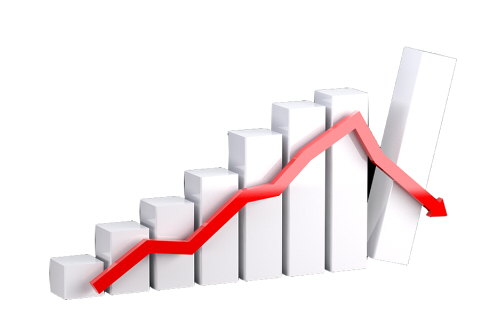What Should I Be Doing with My Money During the COVID-19 Pandemic?
新冠大流行之际,该如何理财?
By Megan DiTrolio
文/梅甘·迪特罗里奥
You’ve heard it on the news, from your dad, and from your friends in banking: COVID-19 is catapulting1 the U.S. into an economic recession. It’s a tumultuous2 time, but that doesn’t mean you have to approach your finances blindly. We tapped3 Sallie Krawcheck, banking veteran and founder of female-focused financial planning service Ellevest, to answer your questions about investing and money management during the COVID-19 pandemic.
从新闻以及家人和在银行工作的朋友那里,你已有所耳闻:新冠疫情使美国突然陷入经济衰退。这是个纷乱动荡的阶段,但并不意味着你只得盲目地处理个人财务。我们特邀萨莉·克劳切克——银行业资深人士,女性财务规划服务平台Ellevest创始人——回答您有关新冠疫情大流行期间投资与理财的问题。
Everyone says we’re on the brink of an economic depression. Is that true?
人人都说我们濒临经济萧条。这是真的吗?
I started my career as a research analyst covering the stock market. I have al-ways thought that the stock market talks to us and tells us what is happening, though sometimes it’s hard to interpret. The stock market is telling us that we are in a recession, probably a depression. It’s telling us that by the fact that it has declined so much, so fast. It was the worst first quarter in 100+ years, and the fastest move from what we call a bull market (an upward trending, robust, strong stock market) to what’s called a bear market, where we fall more than 20 percent (and our market has been down more than 30 percent).
我职业生涯的起点是股市的研究分析师。我一直认为,股市会跟我们交谈,并告诉我们正在发生什么事儿,尽管有时难以解读。股市在告诉我们,我们正处于衰退,很可能是萧条中。股市下跌得如此之多、如此之快,它是用这样的事实来告诉我们的。2020年头三个月,是一百多年来股市表现最差的第一季度,从我们所说的牛市(行情上行、稳健而强劲的股市)向熊市的转变最为迅速。在熊市里股价下跌会超过20%(而我们的市场现在已经跌了超过30%)。
Does that mean it’s too late to sell stocks?
那是否意味着卖出股票为时已晚?
The number one and number two questions we get at Ellevest (and they change in order) is: Should I be buying and should I be selling? Typically, the answer to both is no. If you follow your instinct today and get out, you’re likely going to miss the upturn. The upturn after one of these declines tends to happen before it’s clear that we’re coming out of the recession.
我们在Ellevest被问到的第一个和第二个问题(排序不分先后)是:我该买入吗?我该卖出吗?通常,两者的答案都是“否”。如果你今天听凭直觉逃出了市场,那么你很可能将错过回升。类似的下跌会有多次,某次下跌后的回升往往发生在确定将走出衰退之前。
This idea of “If I can see what’s coming, can I take action?” is wrong. What you should do is something called rebalancing your portfolio (meaning buying or selling assets to maintain a desired level of asset allocation or risk). Let’s say you started off with an investment portfolio that’s made up of 70 percent equity and 30 percent bonds, which is a pretty risky portfolio. With that portfolio, over time you should earn higher returns. Because of what’s going on in the stock market, maybe you’re now no longer at 70-30, you’re at 55-45. Maybe you want to go back to 70-30, which means you want to buy equity and sell bonds. This rebalancing back to your goal can actually force you to make counter-intuitive decisions that you wouldn’t otherwise make.
“如果能觉察即将发生的事,我可以采取行动吗?”这个想法是错误的。你应当做的是调整投资组合(即买入或卖出资产,以保持期望的资产配置或风险水平)。比如说,你开始时的投资组合由70%的股票和30%的债券构成,这是一个相当有风险的组合。随时间推移,你可能凭着这一组合赚得更高回报。鉴于股市的当前状况,现在你的股票与债券投资比例,也许不再是70%比30%,而是55%比45%。或许你想恢复到70%比 30%,这意味着你需要买股票卖债券。这种回到原定目标的再平衡,实际上能够迫使你做出只有这种情况下才会做出的违背直觉的决定。

I’m recently unemployed due to COVID-19. What can I do?
由于新冠疫情,我最近失了业。我怎么办呢?
It depends on your personal circumstance. Unemployment will be expanded, particularly for people who didn’t have unemployment insurance, like freelancers. But for some people, it will still mean spending through your emer-gency funds. For some people it’s going to mean, unfortunately, running up credit card debt. If those things are happening to you, stop investing. Instead, go into conservation mode: You need to replenish your emergency fund and pay down credit card debt before you begin to invest again.
这取决于个人状况。失业的情况会增多,特别是对自由职业者那样没有买过失业保险的人来说。但对有些人来说,仍意味着要靠自己的应急基金维持开销。很不幸,对某些人而言,那将意味着信用卡债台高筑。如果遭遇了那些事,就要停止投资。相反,要进入保护模式:你需要补充应急基金,再次开始投资之前,还掉信用卡债务。
What steps can I take to restore financial health?
为了恢复财务健康,我可以采取哪些步骤?
Sit down and make a list of every area where you’re spending money and where you can begin to cut. Some obvious ones right now are going out to eat and travel. Use those funds to pay down credit card debt. Get rid of unnecessary subscriptions, like Netflix and Hulu. You’re not going to save a million dollars, but it adds up to make a difference.
你把钱花在了哪些方面,哪些可以开始削减,坐下来列个清单吧。显而易见马上就可以削减的是外出吃饭和旅游。用那些钱还掉信用卡债务。取消多余的订阅,如奈飞和Hulu视频。你不会省下百万美元,但积少成多,情况就会有改观。
When do you predict the recovery of our economy will start?
你预计经济何时将开始复苏?
I would expect more volatility in the stock market. I think it will get better before we fully recognize that we’re coming out of the recession. I don’t think we’ll see a full recovery, frankly, until we have some resolution to the virus.
我预料股市会有更多波动。我认为,在我们充分意识到即将走出衰退之前,经济形势会变好。坦率地说,我认为,在找到解决这种病毒的办法之前,我们不会看到经济完全恢复。
Every downturn feels worse than every one that came before when you’re actually in it. This one feels particularly tough because it’s about our health. But, again, we have recovered from recession every time in history. This time, it may take a little bit longer, but the entrepreneurial spirit of the United States of America will come out on the other hand and drive the stock market even higher.
每逢低迷时期,当你切实置身其中时,感受都要比此前的任何一次衰退糟糕。这一次我们感觉尤为艰困,因其事关健康。但是,再说一遍,我们已从历史上的每一次衰退中恢复过来。这一次,或许要稍稍多费些时日,但从另一面看,美国的创业精神将得到发扬,并推动股票市场再创新高。
注释:
1. catapult (使)突然处于……境地。
2. tumultuous 动荡的,动乱的。
3. tap 指定(某人做某事)。
(译者单位:中国社会科学院财经战略研究院)








